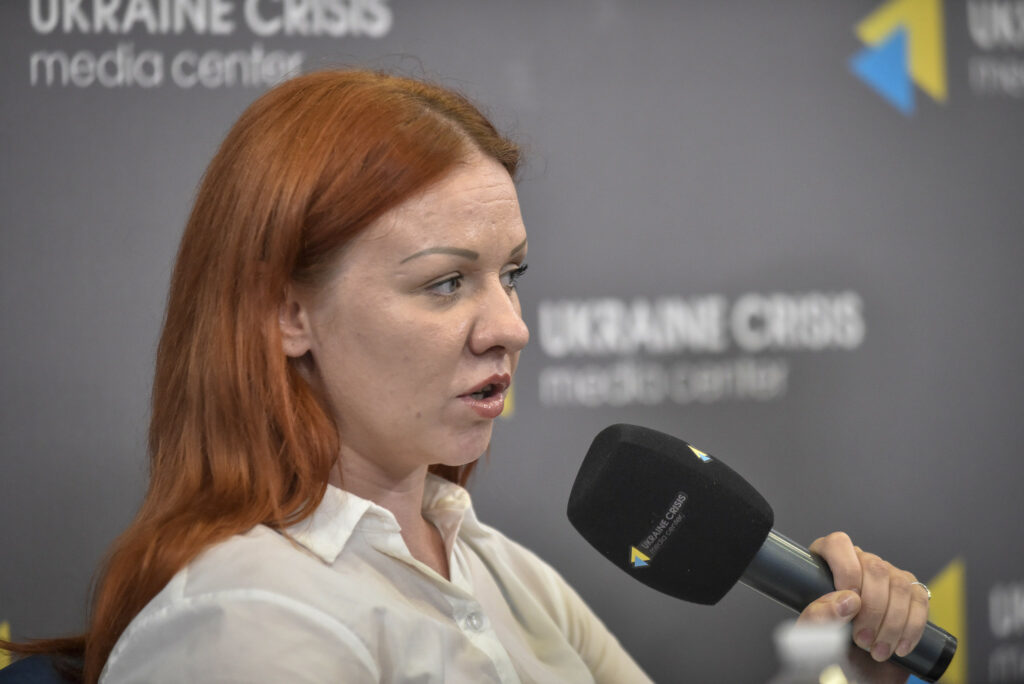“Ukrainian refugees are targeted by Russian propaganda. A campaign by the Kremlin to harass Ukrainians around the world” was the topic chosen for the briefing by the Hybrid Threats Analysis Group of Ukraine Crisis Media Center.
Marianna Prysiazhniuk, Head of HWAG, UCMC, invited Dmytro Zhmailo, Co-founder and Executive Director of the Ukrainian Center for Security and Cooperation, to the event to discuss the peculiarities of this important topic.
Evaluating the general code, he noted that the blitzkrieg approach in Ukraine has failed. Instead, Russia, which had been expanding its influence in Europe for years, had shifted its tactics somewhat. Now, it aims to disrupt each country by leveraging Ukraine’s citizens, fostering radicalization and political instability, and highlighting social issues. The ultimate goal was to compel every democratic nation to take two actions: turn a blind eye to its internal problems and to withdraw from the international coalition supporting Ukraine.
Refugees play a crucial role in these operations, serving as tools within the framework of Russian propaganda and the networks of Russian agents of influence. Dmytro Zhmailo elaborated on this process using the Czech Republic as an illustrative example.
“The country is constantly holding rallies under the guise of social causes, with participants displaying Russian symbols. Recently, some representatives of the Czech Roma minority have joined the campaign. The catalyst for this development was a tragic incident in Brno, where a dispute between Roma youth and a Ukrainian citizen on public transportation happened. While we believe this incident had primarily domestic origins, Russian propaganda swiftly seized upon it, fabricating events that did not actually transpire. Consequently, this led to a series of at least eight incidents openly targeting and harassing Ukrainians in response.”
Dmytro Zhmailo
Simultaneously, he highlighted his successful efforts in countering this campaign. With the support of friends and partners in the Czech Republic, a collaborative gathering was arranged, led by the Roma Union of Czechoslovakia. This assembly paid tribute to the victims and debunked the false information spread by Russian sources. The leader of the Czech Republic’s Roma community explicitly acknowledged that regrettably, some marginalized individuals within the community had fallen under the sway of Russian propaganda. Efforts were being made to alleviate this social tension.
“Relevant consultations were held at the level of government representatives and it was agreed to create so-called monitoring groups that will prevent such facts and monitor the situation to avoid aggravation on ethnic grounds”
Dmytro Zhmailo
Marianna Prysiazhniuk asserts that the trend of amplifying social slogans within the host countries of Ukrainian refugees is likely to intensify, especially with the upcoming election campaign. However, it’s important to note that Russian propaganda doesn’t limit itself to exploiting the issue of Ukrainian refugees alone; it employs various tactics to undermine fledgling democracies.
Nonetheless, it was emphasized that effective countermeasures have been undertaken against this campaign. With the support of friends and partners in the Czech Republic, a united gathering was orchestrated, led by the Czechoslovakia Roma Union. This event paid tribute to the victims and debunked the false narratives propagated by Russian sources. The leader of the Czech Republic’s Roma community candidly acknowledged that regrettably, certain marginalized individuals within the community had been influenced by Russian propaganda. Efforts were actively being made to alleviate this social tension.
Marianna Prysiazhniuk believes that the inclination to amplify social slogans within the countries where Ukrainian refugees reside is expected to rise, particularly as influenced by ongoing election campaigns. However, it’s worth noting that Russian propaganda doesn’t limit its efforts solely to exploiting the issue of Ukrainian refugees; it employs various strategies to undermine emerging democracies.
“Gagauzia, officially recognized as an autonomous region within the Republic of Moldova, has long faced challenges in appointing a speaker for its local parliament. The recent election of a new regional leader has added to the turmoil. However, when accessing news from this region, you won’t find the essential information that local residents need, such as updates on local government decisions, project inaugurations, or financial details regarding local budgets. Instead, the news is dominated by Russian media, which disproportionately focuses on geopolitical issues and Russia’s interests, overshadowing the concerns and needs of this relatively small region consisting of only 15 villages.”
Marianna Prysiazhniuk
However, there are also positive signals. In Moldova, the so-called StratCom is being created under the presidential administration.
“It’s no secret that this is based on the Ukrainian model,” emphasized Marianna Prysyazhnyuk, “This is an example where Ukraine can share its successful experience and best practices. During the war, every fake, information campaign, and IPSO we have created has been filed in folders with the perpetrators, and we really have something to share. As far as I know, Romania is also studying this, and it was a pleasant surprise for me to hear that Bulgaria wants to follow Moldova’s example. This is a good reason to share experiences, build new platforms, dialogues, and bridges to each other to deepen this understanding. When this understanding is absent, a situation of information vacuum is created, and this is the area where Russian propaganda can act effectively.”




